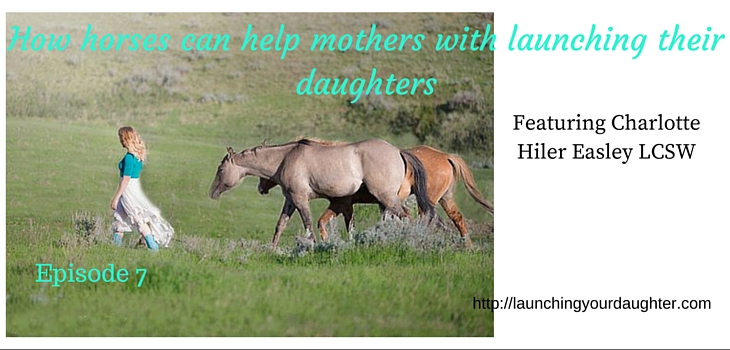
My guest today is Charlotte Hiler Easely who is a licensed clinical social worker of Charlotte Hiler Easely LLC. She is trained in EMDR, certified in equine assisted psychotherapies through PATH, Int. and EAGALA and located in Lexington, KY.
Charlotte offers a variety of workshops for women and one of them she mentions in our conversation is called “Gracefully Letting Go”. This workshop is for Moms who have children that are graduating and preparing to leave the nest. She talks about how mom’s are asked “how do I do this with grace and manage all the emotions?” Working with horses is an experiential approach. I have done this work in the past and I worked with an equine specialist. I found this approach to be helpful and create positive changes for the families I worked with. I hope you enjoy the episode as much as I did with Charlotte. Her work with mothers and using horses can create deeper connections and improve confidence levels.
In this episode you will learn:
*Why horses are used and how they can help women/mothers gain better self-awareness, improve communication skills and set healthy boundaries.
*Horses are large and powerful. This creates a natural opportunity for some to overcome fear and develop confidence. Working alongside a horse, in spite of those fears, creates confidence and provides wonderful insight when dealing with other intimidating and challenging situations in life.
*Horses are social animals, with defined roles within their herds.
*Horses are non-judgmental and non-critical.
*Charlotte shared that during a session she will check in with the woman on what their horse is doing. She will comment on observing the horse’s behavior, ask the woman to reflect back what she thinks the horse is doing and how it applies to the woman’s life.
*Because horses can read and respond to the nonverbal messages we are always sending, they begin to act in ways that feel familiar to other relationships or dynamics in our lives.
*The horse’s prey-nature and intense sensitivity to subtle changes in their environment and to changes in humans (we are predatory creatures) make them perfect partners to teach us a wide range of life and coping skills. They are reflectors of our true selves because their very survival depends on reading us right.
*They provide us with information about non-verbal communication, emotions, and changes in our awareness. Observing horse reactions to our actions and behavior helps further self-awareness.
Charlotte gives examples of how a herd of horses are used during the workshop and applying that to the mother’s family where her teen daughter is leaving. Horses can help parents learn to observe behaviors, explore how that behavior impacts the horse herd and begin to relate it back on how it may affect their other children. “How is that like your teenager who is leaving the herd while the rest of you are staying with the herd?”
*This work is done on the ground and there is no riding. You do not need horse experience. Horses can help women be vulnerable in a new way and not be in control at all times. Working with horses can help the women take off their masks and for their hearts to begin to open allowing them to feel what they may have been afraid to feel.
*Horses help us practice being in the moment and being present. Becoming more aware of our surroundings, your body, keeping yourself safe and practice new ways of being. It also helps different parts of the brain begin to light up and change due to activation of being mindful.
Charlotte shared when we are more mindful of our behaviors this can help create deeper connections in our children. “If we look at how do we approach a horse in his space and then how do we approach our daughters space in a way that we can share with her information that we think is valuable. It is about your body postures not your words.”
If you liked this episode I invite you to subscribe on iTunes to receive the weekly updates. This podcast is also available on Stitcher and Google Play.
Charlotte’s information:
http://lexingtonwomenstherapy.com/
Facebook: charlottehilereasleyLCSW
Pintrest: cheeasleylcsw
Resources:
Equine Assisted Growth and Learning Association EAGALA.org (Can find local providers on the site)
Path International www.pathintl.org
Gratitude Journal-write down what you are grateful for and what is working in your life.
Book Recommendations: (Some of these are affiliate links)
Chris Irwin: Horses Don’t Lie (for those thinking of going into this work or understand horse behavior more)
Townsend and Cloud book series on Boundaries
Brene Brown: Gift of Imperfection
Kirsten Neff: Self-compassion
Linda Graham LMFT: Bouncing Back
